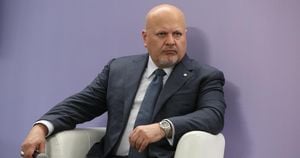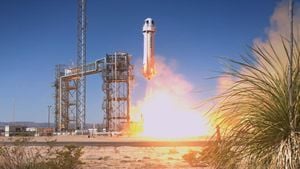On November 21, 2024, tensions erupted once again between Russia and Ukraine as Moscow carried out its first-ever intercontinental ballistic missile (ICBM) strike on Ukrainian soil since the start of the war. The missile struck Dnipro, marking a significant escalation amid fears of retaliation following Ukraine's use of Western-supplied long-range missiles against Russian military targets.
The missile, identified as the Oreshnik or “hazel tree,” was touted by Russian officials as both new technology and as part of their supremacy, flying at speeds exceeding Mach 11. Dmitry Peskov, the Kremlin's spokesperson, defended the strike as necessary, asserting it was aimed not only at Ukraine but was also meant to send a stern warning to the Western nations supporting Ukraine. "This was clearly to signal our capabilities to the reckless actions of the West," he stated.
Peskov claimed Russia had notified the U.S. about the strike approximately 30 minutes before launch, emphasizing the country’s intent not to provoke confusion or fear of direct confrontation with the West. This pre-launch notification system was purportedly implemented to safeguard against miscalculations. The warning was aimed at diffusing potential misinterpretations of intentions, yet it only heightened anxiety on all sides.
Ukrainian President Volodymyr Zelenskyy condemned the attack, categorizing it as “a clear and severe escalation” and called for global condemnation. He urged the international community to recognize Russia’s aggression, stating this incident exemplified Moscow’s disinterest in negotiating peace. Zelenskyy conveyed his frustration, pointing out the relentless nature of the Russian strategy aimed at undermining Ukrainian sovereignty.
The Ukrainian parliament responded to the heightened threat by canceling sessions and advising lawmakers to limit activities due to concerns over potential missile attacks on the capital, Kyiv. This precautionary measure drew mixed reactions among politicians. Member of parliament Oleksiy Goncharenko criticized the decision as excessive, arguing it only fueled panic. Nevertheless, the threat felt all too real for many Ukrainians dealing with daily dangers posed by missile strikes and drone attacks.
Participants at NATO expressed their grave concerns following the missile launch, announcing emergency meetings to address the situation and strategize their response collectively. The urgency was palpable among NATO allies, especially as reports indicated the potential for increased military collaboration between Russia and North Korea, particularly on missile development.
Putin’s remarks following the missile strike reinforced the notion of collective responsibility for the conflict's escalation. He noted the strike was retaliation for Ukraine’s offensive actions using U.S. and U.K. missiles targeting Russian sites, making clear his stance on retribution against the perceived Western involvement. "We are entitled to strike military targets belonging to those who assist Ukraine," he stated confidently.
The backdrop of the missile launch saw several U.S. allies expressing trepidation, indicating the precarious balance of power and the potential for misunderstandings leading to wider conflict. Poland’s Prime Minister, Donald Tusk, remarked on the growing risk of global conflict, asserting the seriousness of the situation. Tusk emphasized the need for NATO and European allies to remain vigilant against the unpredictable nature of the conflict.
Despite the cacophony of conflicting narratives, Moscow emphasized its commitment to deterrence, asserting its missile capabilities had been successfully tested under combat conditions. The type of missile used — classified as hypersonic — can be equipped with nuclear warheads and has the reach to strike most European countries, casting shadows far beyond Ukraine's borders.
International responses to the missile strike revealed the complex dynamics at play. While the United States had previously granted Ukraine the ability to use long-range missiles, this was now set against the backdrop of Russia showcasing its newest ballistic technology as part of its demand for respect on the world stage.
Analysts suggest the missile incident signals not just military strategy but also deep political undercurrents as the globe prepares for potential shifts with the incoming U.S. administration led by Donald Trump. Speculations abound about Trump's foreign policy approach, particularly with regards to NATO and its commitment to Ukraine. Some fear this emboldened Putin, sensing opportunities amid potential reductions of Western support.
Throughout the week, reports of missile fragments and debris filtered through social media platforms, sparking debates among westward analysts on the military capability and the strategic implications of Putin’s bold maneuvers. These discussions reveal both fascination and fear, compounded by the knowledge of Russian military advancements and historical precedents of armed conflict.
With missiles now becoming part of regular dialogues between Kyiv and Moscow, the repercussions could be far-reaching. Just as Ukraine adopts new strategies with Western arms, Russia's arsenal continues to develop, raising concerns about the balance of power and the future of conflict resolution through dialogue.
Looking to the future, the importance of international unity against nuclear threats weighs heavily on national leaders. Western powers must navigate the double-edged sword of supporting Ukraine without provoking Russia, underscoring the inherent unpredictability of modern warfare.
Currently, the military and political landscapes are fraught with tension, as countries on either side brace for possible ramifications of this recent strike. Zelenskyy’s push for unified condemnation could either galvanize support or lead to escalated hostilities as both sides dig their heels, clamoring for control over their narratives and their territories.
On the brink of what could become Europe’s next major armed conflict, the effects of the missile strike will echo through diplomatic chambers worldwide, threading complexity through every interaction and strategy devised moving forward. The world watches, increasingly aware of the shifting tides and the need for unwavering resilience against aggression.



